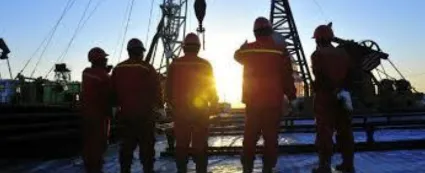
Critical Oil Field Safety Training by Basin Safety
Critical Oil Field Safety Training by Basin Safety
for Companies and their Employees
Critical oil field safety training offered by Basin Safety involves a comprehensive approach to ensure that all personnel working in oil and gas extraction sites are prepared to work safely, respond to emergencies, and understand the unique hazards of the industry. We want to see everyone return home safely after a days work. Here's an outline for a critical oil field safety training program:

Introduction to Oil Field Safety
Overview of the Oil and Gas Industry:
Introduction to oil field operations.
Common terminology and processes.
Importance of Safety:
Statistics on oil field incidents.
Personal and environmental consequences of unsafe practices.
Understanding Hazards
Physical Hazards:
Working with heavy machinery and equipment.
High-pressure lines and compressed gases.
Exposure to noise and vibration.
Chemical Hazards:
Handling hydrocarbons and other chemicals.
Hazard Communication (HAZCOM) standards.
Material Safety Data Sheets (MSDS) for chemicals used on-site.
Biological Hazards:
Potential for contact with harmful bacteria and viruses.
Environmental Hazards:
Working in extreme temperatures.
Potential for spills and environmental contamination.
Safety Protocols and Procedures
Personal Protective Equipment (PPE):
Proper use and maintenance of helmets, goggles, gloves, boots, and other
PPE.
Emergency Response and First Aid:
Basic first aid and CPR training.
Emergency evacuation procedures.
Use of emergency shut-off systems.
Fire Safety:
Use of fire extinguishers.
Understanding fire hazards specific to oil fields.
Electrical Safety:
Recognizing and avoiding electrical hazards.
Fall Protection:
Using harnesses and other fall arrest systems.
Scaffolding and ladder safety.
Safe Work Practices
Job Safety Analysis (JSA) and Hazard Identification:
Assessing risks associated with specific jobs.
Implementing control measures.
Work Permit Systems:
Understanding and complying with work permits for hot work, confined
space entry, etc.
Lockout/Tagout Procedures:
Ensuring proper isolation of energy sources during maintenance.
Safe Handling of Materials:
Rigging and hoisting techniques.
Manual handling and ergonomics.
Health and Environmental Management
Occupational Health:
Monitoring and preventing occupational illnesses.
Hydration and heat stress prevention.
Environmental Protection:
Spill response and cleanup.
Waste management and reduction.
Industry-Specific Training
Well Control and Blowout Prevention:
Understanding well control.
Training on blowout preventers (BOPs).
Hydrogen Sulfide (H2S) Safety:
Detection and protection against H2S.
Rescue and first aid for H2S exposure.
Regulatory Compliance
Understanding Regulations:
Overview of OSHA, EPA, and other relevant regulations.
Company policies and industry best practices.
Continuous Education and Improvement
Training Refreshers:
Regularly scheduled refresher courses to maintain competencies.
Incident Reporting and Investigation:
Procedures for reporting and investigating incidents to prevent recurrence.
Feedback and Updates:
Encouraging worker feedback to improve safety measures.
Staying updated with new safety technologies and practices.
Practical Training and Exercises
Simulations and Drills:
Hands-on practice with safety equipment.
Conducting regular emergency response drills.
Certifications:
Achieving certifications for specialized tasks (e.g., H2S Alive, WellCAP).
Conclusion and Assessment
Knowledge Check:
Written exams or practical assessments to verify understanding.
Evaluations and feedback to identify areas for improvement.
Certification of Completion:
Issuing certificates to individuals who meet the training requirements.
This training should be conducted by qualified professionals and updated regularly to reflect changes in technology, regulations, and best practices. It's critical for oil field workers to not only receive initial training but also to engage in continuous learning and skill development to maintain a culture of safety.
Archives
Categories
Benzene Testing
Bloodborne Pathogens
Breathing Air Systems
Certification Process
Confined Space Attendants
Confined Spaces
Construction Equipment Operators
Electrical
Environmental Compliance
Excavation and Trenching
Fire Extinguisher Training
Forklift Operator
Hazcom Workplace Safety
HAZWOPER
Hearing Protection Training
Heavy Equipment
Hydrogen Sulfide
Lone Worker
Lone Worker Solutions App
Monitoring
Oil and Gas
Oil Drilling
Online Training Confined Spaces
Permit-required
PPE
Radiation Safety
Rescue Equipment
Rescue Team
Safety Consultants
Safety Devices
Safety Tracking
Safety Training
Site Inspections
Training 1
Training 2
Training 3
Training 4
Training 5
Uncategorized
Virtual Access to Safety Data
Waste Haulers
Confined Space Rescue
Mental Health
VISIT US
202 48th Ave SW, Williston, ND 58801
2740 Sims St. Suite B Dickinson, ND 58601
(701) 572-8140

BASIN SAFETY CONSULTING CORPORATION
Basin Safety believes in shared excellence. We are accountable to our core values:
● Pioneering Excellence Everyday
● Supporting each other to put customers first
● Asking the right questions, to ensure the greatest results.
Basin Safety Consulting © 2026. All rights reserved.
Powered By Upleveled Strategies

BASIN SAFETY CONSULTING CORPORATION
Basin Safety believes in shared excellence. We are accountable to our core values:
● Pioneering Excellence Everyday
● Supporting each other to put customers first
● Asking the right questions, to ensure the greatest results.
VISIT US
202 48th Ave SW, Williston, ND 58801
2740 Sims St. Suite B Dickinson, ND 58601
(701) 572-8140
Basin Safety Consulting © 2026. All rights reserved.
Powered By Upleveled Strategies

